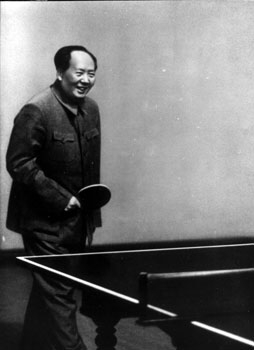Was Mao Zedong an atheist?
Note: Using the argument that Mao's belief in God caused him to do these things is WRONG. And one should be highly skeptical regarding Mao's definition of God and if he even believed in God in the first place. Suffice to say, there is evidence that goes both ways, in terms of justifying a claim that Mao did believe in gods and also that he embraced secular ideals. However, there is absolutely no causal relationship between any atheist position and any antisocial, oppressive activities.
Letting a hundred flowers blossom and a hundred schools of thought contend is the policy for promoting the progress of the arts and the sciences and a flourishing socialist culture in our land.
- -- Mao Tse-tung, Quotations of Chairman Mao Speech (1966), quoted from Encarta Book of Quotations (1999)
The Poems of Mao Tse-tung
All of the below quotes are taken from: Mao Tse-tung (1893 - 1976) Source: The Poems of Mao Tse-tung, Harper & Row
Winds flap the sail, tortoise and snake are silent, a great plan looms. A bridge will fly over this moat dug by HEAVEN and be a road from north to south. We will make a stone wall against the upper river to the west and hold back steamy clouds and rain of Wu peaks. Over tall chasms will be a calm lake, and if the GODDESS of these mountains is not dead she will marvel at the changed world.[1]
The GODS on the death of his wife Yang Kai-hui I lost my proud poplar and you your willow As poplar and willow they soar straight up into the ninth heaven and ask the prisoner of the moon, Wu Kang' what is there. He offers them wine from the cassia tree. The lonely lady on the moon, Chang 0, spreads her vast sleeves and dances for these good SOULS in the unending sky. Down on earth a sudden report of the tiger's defeat. Tears fly down from a great upturned bowl of rain.[2]
Saying Good-bye to the GOD of Disease (2) Thousands of willow branches in a spring wind. Six hundred million of China, land of the GODS, and exemplary like the emperors Shun and Yao. A scarlet rain of peach blossoms turned into waves and emerald mountains into bridges. Summits touch the sky. We dig with silver shovels and iron arms shake the earth and the Three Rivers. GOD of plagues, where are you going? We burn paper boats and bright candles to light his way to HEAVEN.[3]
Saying Good-bye to the GOD of Disease (1) Mauve waters and green mountains are nothing when the great ancient doctor Hua To could not defeat a tiny worm. A thousand villages collapsed, were choked with weeds, men were lost arrows. GHOSTS sang in the doorway of a few desolate houses. Yet now in a day we leap around the earth or explore a thousand Milky Ways. And if the cowherd who lives on a star asks about the GOD of plagues, tell him, happy or sad, the GOD is gone, washed away in the waters.[4]
Little red book
The below is taken from "Self-Reliance and Arduous Struggle chapter 21":
There is an ancient Chinese fable called "The Foolish Old Man Who Removed the Mountains". It tells of an old man who lived in northern China long, long ago and was known as the Foolish Old Man of North Mountain. His house faced south and beyond his doorway stood the two great peaks, Taihang and Wangwu, obstructing the way. With great determination, he led his sons in digging up these mountains hoe in hand. Another graybeard, known as the Wise Old Man, saw them and said derisively, "How silly of you to do this! It is quite impossible for you few to dig up these two huge mountains." The Foolish Old Man replied, "When I die, my sons will carry on; when they die, there will be my grandsons, and then their sons and grandsons, and so on to infinity. High as they are, the mountains cannot grow any higher and with every bit we dig, they will be that much lower. Why can't we clear them away?" Having refuted the Wise Old Man's wrong view, he went on digging every day, unshaken in his conviction. This moved GOD, and he sent down two angels, who carried the mountains away on their backs. Today, two big mountains lie like a dead weight on the Chinese people. One is imperialism and the other is feudalism. The Chinese Communist Party has long made up its mind to dig them up. We must persevere and work unceasingly, and we, too, will touch GOD's heart. Our GOD is none other than the masses of the Chinese people. If they stand up and dig together with us, why can't these two mountains be cleared away? [5]
the Tao of Mao
There is some suggestion that Mao was at least influenced by Taoism: [6]
Some of Mao's quotes also represent a kind of Taoist thinking such as "We should support whatever the enemy opposes and oppose whatever the enemy supports"
References
- . The Poems of Mao Tse-tung, Harper & Row June 1956
- . The Poems of Mao Tse-tung, Harper & Row May 11, 1957
- . The Poems of Mao Tse-tung, Harper & Row July I, 1958
- . The Poems of Mao Tse-tung, Harper & Row July 1, 1958
- . "The Foolish Old Man Who Removed the Mountains" (June 11, 1945), Selected Works, Vol. III, p. 322.
- . http://taoism21cen.com/Englishchat/essay4.html
This site costs a lot of money in bandwidth and resources. We are glad to bring it to you free, but would you consider helping support our site by making a donation? Any amount would go a long way towards helping us continue to provide this useful service to the community.
Click on the Paypal button below to donate. Your support is most appreciated! |
|---|



